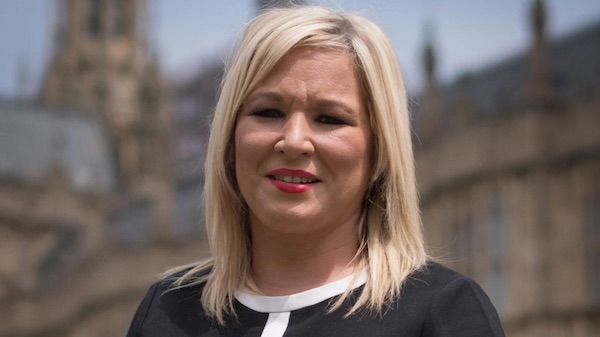
Ireland is entering a decade of opportunity, according to Sinn Féin’s Deputy First Minister Michelle O’Neill.
During the course of the decade from 2012-2022 we are marking the centenaries of seminal events, which have shaped modern Irish history over the past century.
Events which have defined our relationship with Britain over the past 100 years and been characterised by colonialism, partition and political division.
This year marks the anniversaries of much darker times when in 1920 the Black and Tans were introduced, and the Lord Mayor of Cork, Tomás Mac Curtáin, was murdered. His killing was followed shortly by the death of Sinn Féin Lord Mayor Terence MacSwiney after 74 days on hunger strike. And in December that year the Government of Ireland Act was enacted in Westminster forcing partition on Ireland.
The Government of Ireland Act came into force on 21st May 1921, with the British King George V convening the Northern Ireland parliament that June with James Craig becoming Prime Minister of the Northern State.
Unionism will celebrate and eulogise these events.
Nationalism will see it differently. There will be no celebration of partition which has failed the people of this island.
We will present our political perspectives and experiences of partition and the one-party unionist state with its in-built unionist majority, and direct and structural discrimination against the catholic and nationalist population.
But we will also place these historical events and experiences in their contemporary context.
The political, social and cultural consequences of what happened between 1912-1922 still reverberate throughout the island.
While trying to heal the wounds of the past, we must also live and strive in the present.
I often say there is no future in the past.
The peace process and Good Friday Agreement have created an alternative to conflict.
That Agreement provides a peaceful democratic pathway to Irish unity, which I believe will become a reality during this decade.
Today’s Assembly is unrecognisable from the previous iterations of the old unionist regime at Stormont.
Today the Executive is formed by, and is representative of all the people in the North. That is the difference to the failed regimes that went before.
The once monolithic unionist majority has gone.
Unionist support for the unprecedented folly of Brexit has created the biggest constitutional crisis for unionism in a century.
Brexit has exposed the undemocratic nature and failure of partition in Ireland.
The fulcrum of the Brexit crisis is the border in Ireland.
Attempts by the Tories and their allies to demolish the GFA will continue to be resisted.
We are not only witnessing the realignment of Irish politics on this island; we are shaping it.
We are entering a decade of opportunity where the freedom to choose our own future will be decided by the people on this island alone.
This is a defining moment in the history of Ireland.
And the decisions that all the people on this island make now will shape the direction of our island for the next generation.
The approach to the centenary of partition I am arguing for is one where republicanism and unionism contribute to a national conversation.
For our part Sinn Féin will set out with confidence our analysis, experience and vision of an open, inclusive and agreed Ireland.
The political momentum on change is moving in that direction.
We must promote reconciliation, as distinct from deepening division.
We have lived a century apart, and partition has failed.
We have lived for much too long back to back. It’s time to start living side by side.
A stark choice is opening up between the narrow, inward-looking vision of Brexit Britain and the open inclusive vision of a New Ireland.
This is a time for debate, big ideas and a public discourse that threatens no one.
![[Irish Republican News]](https://republican-news.org/graphics/title_gifs/rn.gif)
![[Irish Republican News]](https://republican-news.org/graphics/title_gifs/harp.gif)

